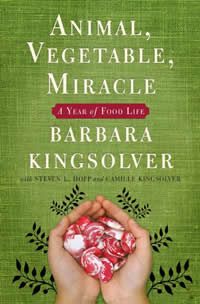Book Notes
 Barbara Kingsolver, Animal, Vegetable, Miracle: A Year of Food Life (New York: Harper Collins, 2007), 384pp.
Barbara Kingsolver, Animal, Vegetable, Miracle: A Year of Food Life (New York: Harper Collins, 2007), 384pp.
A guest book review by Milton Brasher-Cunningham, a writer and chef who is married to a minister in the United Church of Christ. They will soon move from their home south of Boston to Durham, North Carolina, where Ginger will pastor a UCC and Milton will cook and write.
When I picked up Barbara Kingsolver’s new memoir, I expected Walden with a family: she was moving with her husband (a professor of environmental science) and two daughters from their home in the Southwest back to his family farm in Virginia. As a part of the move, they decided they would eat only what they could grow or find grown or made within one hundred miles of their house. The challenge seemed admirable, but I was still a bit skeptical. They already owned the farm and the royalties alone from Kingsolver's The Poisonwood Bible must have afforded them a comfortable lifestyle. Yet, the story she tells is informative without being didactic, personal without being overly sentimental, and real.
Though Kingsolver writes the bulk of the memoir, her husband peppers the book with scientific articles and her college-aged daughter shares anecdotes and recipes. The younger daughter shows her entrepreneurial spirit with her burgeoning egg business. As the family’s year in food begins to unfold, what emerges is a call to a food ethic, making the case for restraint as a virtue: "We’re raising our children on the definition of promiscuity if we feed them a casual, indiscriminate mingling of foods from every season plucked from the supermarket, ignoring how our sustenance is cheapened by wholesale desires" (31).
About six summers ago I planted my first tomatoes in our back yard. Here in New England planting doesn’t happen until Memorial Day, so we had to wait for the fruits of our labor until almost Labor Day. One trip in from the garden to make tomato sandwiches with the ones we had grown taught us that the only tomatoes worth eating are fresh tomatoes in season. I don’t buy them any other time; they are worth the wait.
Kingsolver’s “food year” highlighted how separated we have become from the food we eat. We think meat comes shrink-wrapped and vegetables are always uniform in size and stack easily into pyramids. Her family’s sojourn showed how important physical and relational connections are to what we eat. Beyond the taste and even the economics of eating locally, the human contact with those who grew and produced the food changed the family and deepened the meanings of their meals.
The biggest surprise in the book for me was that Kingsolver made no case for vegetarianism. Her discussion about being an ethical carnivore is some of her best writing, and also true to the spirit of farming. Again, she spoke to the relational ethic of eating.
The other surprise came as she began to draw the year to a close: "The biggest shock of our year came when we added up the tab. We’d fed ourselves, organically and pretty splendidly we thought, on about fifty cents per family member, per meal — probably less than I spent in the years when I qualified for food stamps" (343).
The life Kingsolver describes is one built around an ethic of restraint, relationship, and resolve. Her words are poignant and prophetic, echoing preachers from long ago: "For everything there is a season."


